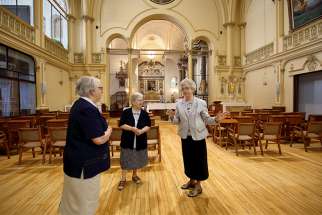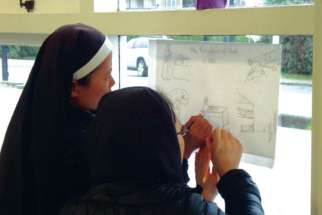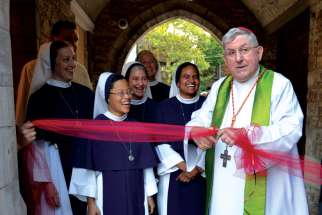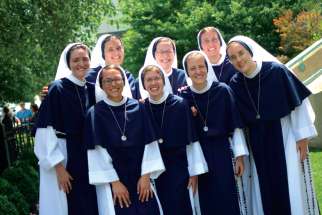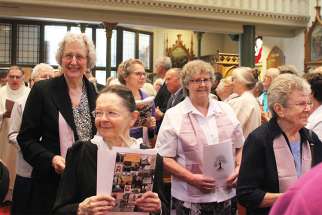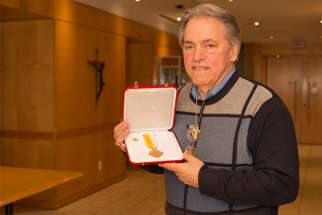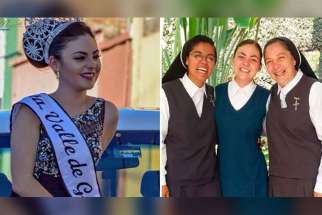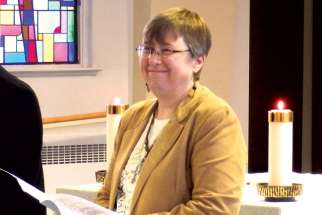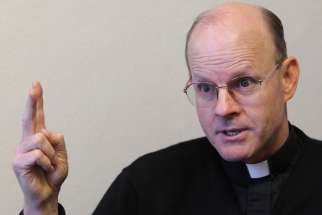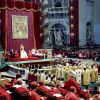Quebec Ursulines leave 17th-century monastery, ending a 400-year era
Children are embracing hands-on Catechism
VANCOUVER – An innovative program has revamped religious education at St. Francis of Assisi Parish in Vancouver.
Toronto's Sisters of Life move into ‘spiritual hub’
The Toronto Sisters of Life are opening up a new chapter in their ministry in the heart of the city.
B.C. woman part of record vow ceremony with Sisters of Life
VANCOUVER – On a continent where some longtime religious communities are suffering a decline in numbers, at least one congregation is truly flourishing.
Sisters of St. Ann plan to keep their mission going amid shrinking numbers and climbing age
VICTORIA, B.C. – Over the past 160 years, the Sisters of St. Ann have taught thousands of students, treated thousands more patients, and multiplied social justice efforts in B.C.
Of course Mario Biscardi was given prior notice that he was to receive the highest honour the Vatican bestows on any layperson.
Sr. Elizabeth Kass, advocate for deaf community, dies at age 84
A love that is louder than noise
As a child, I wanted to be famous. It wasn’t so much that I wanted to be well known or revered. Rather, I wanted my life to matter. In my limited childhood understanding, fame was the reward for a life that mattered.
MEXICO CITY, Mexico – Esmeralda Solís Gonzáles is a young Mexican woman who was crowned last year as a beauty queen in her native town – and now she's joined the Poor Clare Missionaries of the Blessed Sacrament.
Better late than never for the religious life
ATHLONE, Ireland - The Catholic Church is "no longer a safe haven for child abusers," said a top priest psychologist who advises the U.S. bishops on child sexual abuse.
Jock picks God over game
Br. Nathan Wayne had an atypical road to the religious life.
A self-described “total jock” during his high school years in Syracuse, N.Y., he was a star player on the Christian Brothers Academy basketball team, a school renowned for its athletics, and also enjoyed football and skiing. The now 26-year-old member of the Legion of Christ credits a few committed recruiters with leading him to where he is today, serving youth across Ontario.
What changed at Vatican II
Things changed with the Second Vatican Council. No one disputes that the Catholic faith remained what it has always been. The Church still teaches what the Church always taught. But the Council did not assemble 2,860 bishops to recite the catechism. The fact that the bishops commissioned the first authoritative catechism in 350 years was just one of many changes initiated at the Council.
Among the most important changes:
- Liturgy: Vernacular languages were encouraged, especially for Scripture readings at Mass, which became far more extensive with added Old Testament readings and a cycle of three years which focusses on each of the three synoptic Gospels (Matthew, Luke and Mark). By 1969 the Novus Ordo Mass allowed priests for pastoral reasons to face the assembly, gave the celebrant a variety of eucharistic prayers, restored the sign of peace to the entire congregation, allowed for distribution of both the body and blood of Christ under the forms of bread and wine and moved tabernacles off the altars to a noble and prominent location elsewhere in the church or a separate chapel. By 1973 the International Commission for English in the Liturgy produced the first official translation of the New Mass, though various provisional translations had been circulating since the end of the Council.
- Ecumenism: Unitatis Redintegratio declared the ecumenical movement a good thing, encouraged Catholics to be part of it and referred to Eastern, Oriental and Protestant Christians as "separated brethren." In 1928 Pope Pius XI had condemned the ecumenical movement. From the Council of Trent until the Second Vatican Council Protestants were officially referred to as heretics.
- Democracy and religious liberty: In Dignitatis Humanae the Church for the first time recognized the conscience rights of all people to freedom of religion, and declared it was the responsibility of states to protect religious freedom with stable laws. The idea that the state should be neutral in religion, or that liberal democratic states could be entrusted to protect human dignity or even that there was any such thing as a right to religious freedom, had been condemned by Pope Pius IX.
- Relations with Jews: "The Jews should not be presented as rejected or accursed by God," said Nostra Aetate. The charge of deicide was unfounded. The New Covenant is not possible without Abraham's stock.
- Relations with other religions: "The Church rejects nothing that is true and holy in these religions," said Nostra Aetate.
- Religious Life: Sisters, brothers and religious order priests were to do two things — rediscover the original purpose of their religious order and adapt it to the modern world, said Perfectae Caritatis.
- Canon Law: The Council fathers ordered a revised and written code of canon law that was finally delivered under Pope John Paul II in 1983.

